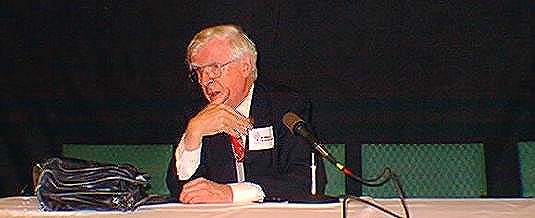

U.S. Assistant Secretary of
Health Phillip Lee
scott martin
cns news & features
San Francisco--
Health care experts touted preventive medicine as the key to economizing a health care system hard hit by private industry and reeling from impending federal welfare reform.
This week's health summit in San Francisco had panelists whose diverse backgrounds--from ex-prostitutes to CEO's--well represented the city it sought to revitalize.
Experts said cooperation within the health care industries was vital to finding solutions for old problems.
The federal welfare reform bill will strip MediCal from those termed "legal immigrants" and is estimated to cost San Francisco $93 million.
Said U.S. Assistant Secretary of Health Phillip Lee, "We are all immigrants in this town."
San Francisco Health Department Director Sandra Hernandez said preventive care, rather than "safety net" care, would minimize costs. Taxpayers, she said, would have to pick up the tab for "safety net" treatments such as hospitals, jails, and institutions that deal with people when the problems are severe, costing the city more money in the long run than preventive treatment.
"It's more expensive," Hernandez said, "we've got to turn this system around."
San Francisco's residents are already underinsured with 116,000, or 16 percent, of San Francisco's 724,000 population uncovered. But it is estimated there will be an additional 26,000 legal immigrants who will not have health care because of the welfare reform bill.
Pressing the issue of prevention was Norma Hotaling, Director of Sage, a local organization that helps recovering prostitutes and victims of sexual abuse in San Francisco. She said that the city needs to work more closely with local organizations to solve problems and ultimately cut costs.
Hotaling criticized recent talk about legalizing prostitution. "Prostitution should not be legalized; there are millions of girls that are trafficked and sold," Hotaling said. "Prostitution equals abduction." The medical costs can be enormous, she said.
Stephanie Muller, assistant director of a substance-abuse program in San Francisco called Delancey Street, said there needs to be a "pooling of resources" between health care organizations.
Jack Lewin, CEO of the California Medical Association, praised Hawaii as a model for San Francisco health care reform. "Hawaii spends 35 percent less per capita than the rest of the nation and has universal care," said Lewin. "Due to preventive care," he said, "they don't use the hospitals as a home, raising (health care) costs.
Lee cited national solutions that have had an impact on local prevention. "Far and away the biggest problem is smoking," Lee said. Approximately 15 percent of cancer deaths in San Francisco are smoking-related. He said that FDA regulation of cigarettes aims to reduce cigarette smoking.
It has been estimated, Lee said, that 20 to 30 percent of our medical dollars go for ineffective or inappropriate care. "There's an opportunity to capture some significant funding," he said.
"San Francisco is a model," Lee said, "to get health care on the national agenda."
(8/15/96)
Comments?
editor@coastnews.com